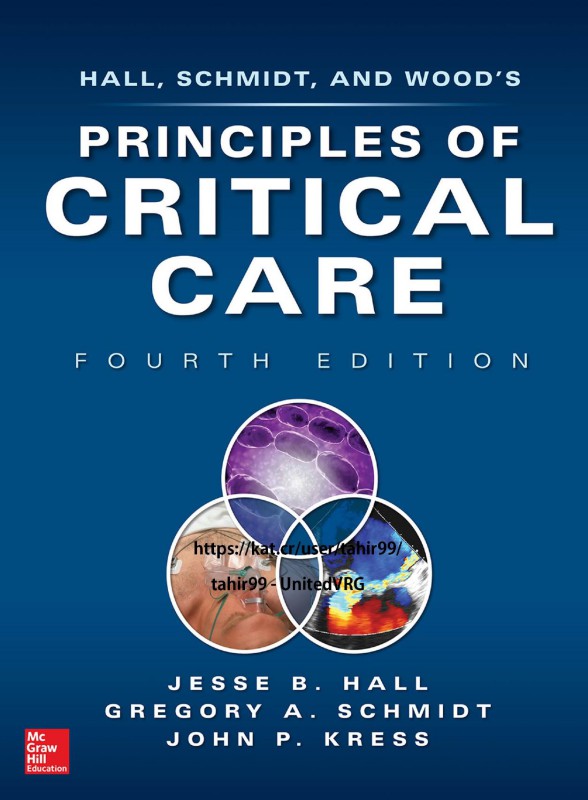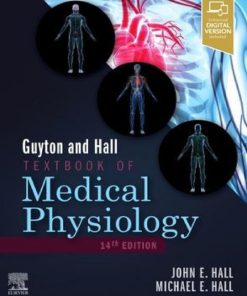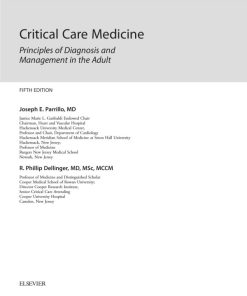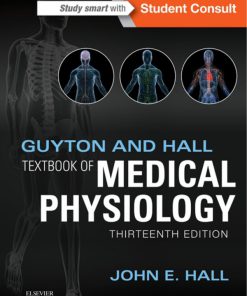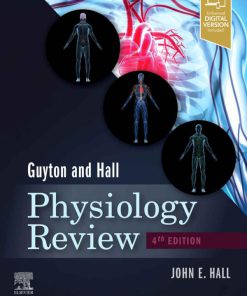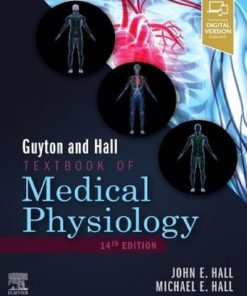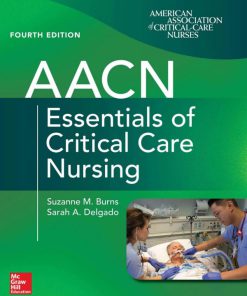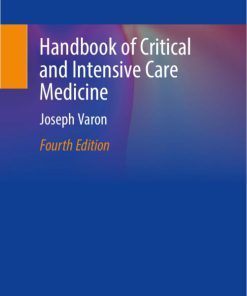Principles of Critical Care 4th Edition by Jesse Hall, Gregory Schmidt, John Kress ISBN 0071753273 9780071753272
$50.00 Original price was: $50.00.$25.00Current price is: $25.00.
Authors:Principles of Critical Care-McGraw-Hill (2015) , Author sort:Care-McGraw-Hill, Principles of Critical , Published:Published:Jun 2015
Principles of Critical Care 4th Edition by Jesse B. Hall, Gregory A. Schmidt, John Kress – Ebook PDF Instant Download/Delivery. 0071753273, 9780071753272
Full download Principles of Critical Care 4th Edition after payment
Product details:
ISBN 10: 0071753273
ISBN 13: 9780071753272
Author: Jesse B. Hall, Gregory A. Schmidt, John Kress
Principles of Critical Care 4th Edition:
Quickly and accurately diagnose and treat the critically ill patient with guidance from the field’s definitive text
A Doody’s Core Title for 2022!
“…Clearly the finest textbook available in the field.” — Critical Care Medicine journal
“…Very well done…unusually user-friendly…excellent…a significant contribution to the field. It should be placed not only in the critical care practitioner’s library, but also in the rounds and nurses’ conference rooms of critical care units.” — Journal of the American Medical Association
Considered the field’s definitive text, Principles of Critical Care offers unmatched coverage of the diagnosis and treatment of the most common problems encountered in the practice of critical care. Written by expert critical care physicians who are also experienced teachers, the book features an organization, thoroughness, and clarity not found in any other reference on the topic. Within its pages, you will find comprehensive, authoritative discussion of every aspect of critical care medicine essential to successful clinical practice, ranging from basic principles to the latest technologies.
The fourth edition is highlighted by:
- A new full-color presentation
- NEW CHAPTERS on ICU Ultrasound, Extracorporeal Membrane Oxygenation, ICU-Acquired Weakness, Abdominal Compartment Syndrome, and Judging the Adequacy of Intravascular Volume
- The addition of many new figures and diagnostic and treatment algorithms
- In-depth, up-to-date descriptions of the unique presentation, differential diagnosis, and management of specific critical illnesses
- A logical organ system approach that simplifies the search for thorough and practical information necessary to manage a patient’s specific condition
- The integration of pathophysiology throughout the text
- Content that reflects today’s interdisciplinary approach to critical care medicine
Principles of Critical Care 4th Edition Table of contents:
-
PART 1: An Overview of the Approach to and Organization of Critical Care
- An Approach to Critical Care
- Measuring Quality
- Intensive Care Unit Staffing
- Infection Prevention and Surveillance in the Intensive Care Unit
- Preventing Morbidity in the ICU
- Assessing Cost-Effectiveness in the Intensive Care Unit
- Interpreting and Applying Evidence in Critical Care Medicine
- Principles of Medical Informatics and Clinical Informatics in the ICU
- Preparedness for Catastrophe
- Telemedicine and Regionalization
- Transportation of the Critically Ill Patient
- Rapid Response Teams
- Assessment of Severity of Illness
- Chronic Critical Illness
- Long-Term Outcomes After Critical Illness
- Care of the Caregiver in the ICU and After Critical Illness
- Caring for the Family
- Providing Palliative Care and Withholding or Withdrawing Life-Sustaining Therapy
- Legal Issues in Critical Care
-
PART 2: General Management of the Patient
- Nutrition Therapy in the Critically Ill
- Glycemic Control
- Pain Control, Sedation, and Use of Muscle Relaxants
- Sleep
- Physical Therapy
- Cardiopulmonary Resuscitation
- Therapeutic Hypothermia
- Intravascular Devices in the ICU
- Interpretation of Hemodynamic Waveforms
- ICU Ultrasonography
- Interventional Radiology
-
PART 3: Cardiovascular Disorders
- The Pathophysiology of the Circulation in Critical Illness
- Assessing the Circulation: Oximetry, Indicator Dilution, and Pulse Contour Analysis
- Shock
- Judging the Adequacy of Fluid Resuscitation
- Ventricular Dysfunction in Critical Illness
- Cardiac Arrhythmias, Pacing, Cardioversion, and Defibrillation in the Critical Care Setting
- Myocardial Ischemia
- Acute Right Heart Syndromes
- Pulmonary Embolic Disorders: Thrombus, Air, and Fat
- Pericardial Disease
- Valvular Heart Disease
- Aortic Dissection
-
PART 4: Pulmonary Disorders
- The Pathophysiology and Differential Diagnosis of Acute Respiratory Failure
- Noninvasive Ventilation
- Airway Management
- Tracheostomy
- Upper Airway Obstruction
- Ventilator Waveforms: Clinical Interpretation
- Management of the Ventilated Patient
- Novel Modes of Mechanical Ventilation
- Ventilator-Induced Lung Injury
- Acute Lung Injury and the Acute Respiratory Distress Syndrome
- Extracorporeal Lung Support
- Acute-on-Chronic Respiratory Failure
- Status Asthmaticus
- Thoracostomy
- Massive Hemoptysis
- Restrictive Disease of the Respiratory System
- Ventilator-Associated Pneumonia
- Liberation From Mechanical Ventilation
-
PART 5: Infectious Disorders
- Principles of Antimicrobial Therapy and the Clinical Pharmacology of Antimicrobial Drugs
- Sepsis and Immunoparalysis
- Persistent Fever
- Sepsis, Severe Sepsis, and Septic Shock
- Pneumonia
- Infectious Complications of Intravascular Access Devices Used in Critical Care
- Endocarditis and Other Intravascular Infections
- Approach to Infection in Patients Receiving Cytotoxic Chemotherapy for Malignancy
- Human Immunodeficiency Virus (HIV) and AIDS in the Intensive Care Unit
- Fungal Infections
- Bacterial Infections of the Central Nervous System
- Encephalomyelitis
- Life-Threatening Infections of the Head, Neck, and Upper Respiratory Tract
- Soft Tissue Infections
- Urinary Tract Infections
- Gastrointestinal Infections and Clostridium Difficile
- Management of the Critically Ill Traveler
- Severe Malaria
- Tetanus
- Viral Hemorrhagic Fevers
- Biological Warfare
-
PART 6: Neurologic Disorders
- Delirium in the Intensive Care Unit
- ICU-Acquired Weakness
- Cerebrovascular Disease
- Seizures in the Intensive Care Unit
- Intracranial Pressure: Monitoring and Management
- Neuromuscular Diseases Leading to Respiratory Failure
- Coma, Persistent Vegetative State, and Brain Death
-
PART 7: Hematologic and Oncologic Disorders
- Anemia and Red Blood Cell Transfusion in Critically Ill Patients
- Bleeding Disorders
- TTP, HUS, and Other Thrombotic Microangiopathies
- Acute Leukemia
- Oncologic Emergencies
- Hematopoietic Stem Cell Transplantation and Graft-Versus-Host Disease
- Toxicities of Chemotherapy
- Sickle Cell Disease
-
PART 8: Renal and Metabolic Disorders
- Acute Kidney Injury
- Renal Replacement Therapy in the Intensive Care Unit
- Electrolyte Disorders in Critical Care
- Acid-Base Balance
- Hyperglycemic Crisis and Hypoglycemia
- Critical Illness–Related Corticosteroid Insufficiency
- Thyroid Disease
-
PART 9: Gastrointestinal Disorders
- Jaundice, Diarrhea, Obstruction, and Pseudoobstruction
- Gastrointestinal Hemorrhage
- Acute Liver Failure
- Management of the Patient With Cirrhosis
- Acute Pancreatitis
- Mesenteric Ischemia
-
PART 10: The Surgical Patient
- Special Considerations in the Surgical Patient
- Preoperative Assessment of the High-Risk Surgical Patient
- Principles of Postoperative Critical Care
- The Acute Abdomen and Intra-abdominal Sepsis
- Abdominal Compartment Syndrome
- The Transplant Patient
- Care of the Multiorgan Donor
- Priorities in Multisystem Trauma
- Head Injury
- Spinal Injuries
- Torso Trauma
- Pelvic Ring Injuries and Extremity Trauma
- Electrical Trauma
- Critical Care of the Burn Patient
-
PART 11: Special Problems in Critical Care
- Toxicology in Adults
- Critical Care Pharmacology
- Rheumatology in the ICU
- Critical Illness in Pregnancy
- Anaphylactic and Anaphylactoid Reactions
- Dermatologic Conditions
- The Obesity Epidemic and Critical Care
- Hypothermia
- Diving Medicine and Drowning
People also search for Principles of Critical Care 4th Edition:
concept and principles of critical care nursing
principles of adult surgical critical care pdf
principles and practice of critical care nursing
principles and practice of critical care p.k verma
principles of pediatric anesthesia and critical care
You may also like…
eBook PDF
Critical Decisions in Periodontology 4th Edition by Walter Hall ISBN 1550091840 9781550091840
eBook PDF
Handbook of Critical Intensive Care Medicine 4th edition by Joseph Varon 9783030682705 3030682706

